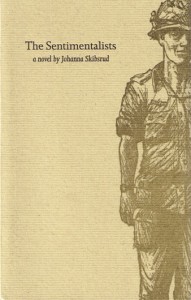November 29, 2010
The Sentimentalists by Johanna Skibsrud
 The 2010 Gillers picked a book out of the blue for me, pushed me to pay it closer attention than I might have otherwise, and the payoff was enormous. This is literary awards at their very, very best (and also makes clear that “what sells” is self-fulfilling prophecy, marketing types take note). I was lucky enough to get my mitts on a Gaspereau Press edition of Johanna Skibsrud’s The Sentimentalists, which meant that my book was a book of a book, hand stitched, thick paper, a dust jacket for a paperback. Such care; for me this is “what sells” and I bought it.
The 2010 Gillers picked a book out of the blue for me, pushed me to pay it closer attention than I might have otherwise, and the payoff was enormous. This is literary awards at their very, very best (and also makes clear that “what sells” is self-fulfilling prophecy, marketing types take note). I was lucky enough to get my mitts on a Gaspereau Press edition of Johanna Skibsrud’s The Sentimentalists, which meant that my book was a book of a book, hand stitched, thick paper, a dust jacket for a paperback. Such care; for me this is “what sells” and I bought it.
I pushed through the story in a way I might not have had the book not been so celebrated. There was a lack of precision in the language, a distance between the reader and the story, and I kept putting the book down and not rushing to pick it up again. But I think this was as the book was intended to be read, a long slow journey without a destination in mind. Because when we arrive at the end of the book, at our destinations, the answers are still not all apparent. By which I mean that if you’re reading to find out what happens next, you’re probably going to find this book disappointing.
An intimacy creeps into the story though, between these people and I, as two fighting sisters drive their ailing father across the country. Sisters are at each others’ throats, banding together only to rally against their father who keeps lighting up cigarettes and forgetting to open the window– the family dynamics are set in motion, and they tell us who these people are and where they’ve come from; we are there. That the sisters have constructed their lives out of pieces, and now they’re older, they’re both discovering that lives are pieces after all. When the narrator discovers her partner with another woman, she goes to be with her father where he’s living with Henry, a family friend. It was at Henry’s where she and her sister spent their childhood summers, on the banks of a lake that had flooded where a town used to be, and being there is to have an awareness of the drowned town, ever-present whether it can be seen or not.
Which serves as a metaphor for the story of her father, who is called Napoleon Haskell, and his relationship to Henry, whose son Owen served with Napoleon in Vietnam. During the summer the narrator spends with her father and Henry, she constructs the story of her father’s past, what happened to Owen, and what had happened to Napoleon to fracture the rest of his life into just pieces of pieces.
Throughout the story, Napoleon is hard at work on crossword puzzles, and these puzzles are an indication as to the novel’s construction. Blanks are filled in from clues, with their correctness not always assured, but the puzzle takes on its own shape anyway. The puzzles pieces include Skibsrud’s prose, sentences with their many, many clauses, as well as allusions to poetry and film, and concludes with a transcript from Napoleon’s testimony of what he witnessed during his time as a soldier. The transcript provides many of the answers the rest of the story had been withholding, and creates an altogether satisfying conclusion to the novel, which doesn’t provide all the answers, but the effect is very much of a whole.
The Sentimentalists is sentimental, unabashedly so, but perhaps if you don’t like sentimental, find a book with another title. Because I liked this book, which portrays the humanness of men at war, particularly during this time when we’re all being brainwashed to believe that “soldier” and “hero” are synonyms. I like what it says about history and story– that the former can never been captured, and the latter has wings of its own. I like the tender gruffness of its men, that love and poetry are what remains, that some things may be irreparable but that doesn’t mean they’re truly broken.






I am still waiting for my copy of this book to arrive from Amazon. I am guessing it won’t be a hand stitched Gaspereau printing but one of the mass produced editions. Still, looking forward to this novel. Your review has me curious about the crossword puzzles as a storytelling device. Very interesting…